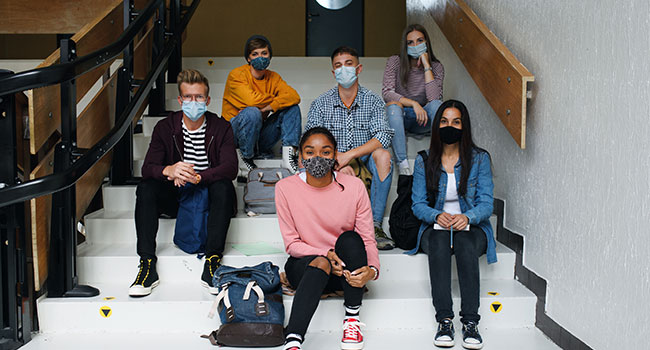
Resident Assistants Face Additional Difficulties During COVID-19
- By Matt Jones
- February 12, 2021
Resident assistants (RAs) are the first line of defense and peacekeeping in college dorms around the country. Traditionally, they’ve been in charge of everything from mentoring students to settling roommate disputes to enforcing university policies. However, against the backdrop of the COVID-19 pandemic, many of them find their responsibilities increasing exponentially—and with much more at stake than ensuring a clean, quiet living area.
RA duties now include enforcing mask-wearing and proper social distancing procedures in campus housing. They establish bathroom schedules to keep the facilities from getting overcrowded. They struggle to engage personally with their residents in an environment where face-to-face communication is discouraged. And cleaning up vomit or other bodily fluids is no longer just unsavory, but potentially life-threatening.
Cornell University RA Kenny Wong acknowledges the difficulty of the situation. “College students will be college students, and you can’t really stop them from engaging in social activities,” he said. “[T]hat is what people do in college, and we can only try and make the environment safe for them.”
Enforcing university coronavirus-related policies has also proved difficult, according to Cornell University RA Thomas Petluck. “When I do rounds, I’ll be like, ‘Hey, put on your mask,’ but then they just take it off three seconds later,” he said. “There is no set punishment for it.”
An RA from Duke University, who spoke to the campus newspaper on the condition of anonymity, described the uphill battle of preventing college students from enjoying the traditional college experience. He says he witnessed how RAs or campus police would break up large outdoor gatherings of students, only to watch them “break up into small chunks and move into people’s rooms.”
The greatest danger to RAs is, of course, their own safety, and many struggle with how far into harm’s way to place themselves to perform their duties. One stated, “It’s unfair to ask anyone to go to a group of unmasked people and ask them to put their masks on.” Similarly, Cornell Student Assembly president Cat Huang conceded, “We can’t control who [our residents] see, what they do, and the fact that we’re living so closely and a lot of us share bathrooms with our residents.”
Cornell RA Wong summarizes the situation nicely: “I tell my residents this all the time: ‘My life is in your hands.’ If they get sick, I am sharing the space with them, then I’ll get sick.”
However, Baylor University RA Ali Husain notes that most of his residents have been responsive to the tightened policies. He says that most students recognize that “rule-breaking has more dire consequences, up to and including causing a full University shutdown…Now, when residents pack into a dorm room, do not wear masks, or sneak away to large parties, it’s us as RAs, our other residents, and the school as a whole that are put in danger. I’ve felt that residents are more or less cooperative, but other RAs have had experiences that certainly differ.”
Sources:
https://cornellsun.com/2021/02/11/ras-worry-about-health-concerns-as-campus-covid-cases-rise/
https://www.bu.edu/articles/2020/being-an-ra-during-covid-19/
https://www.dukechronicle.com/article/2020/09/duke-university-ra-excessive-coronavirus-rule-violation-extra-work-inconsistent-communication